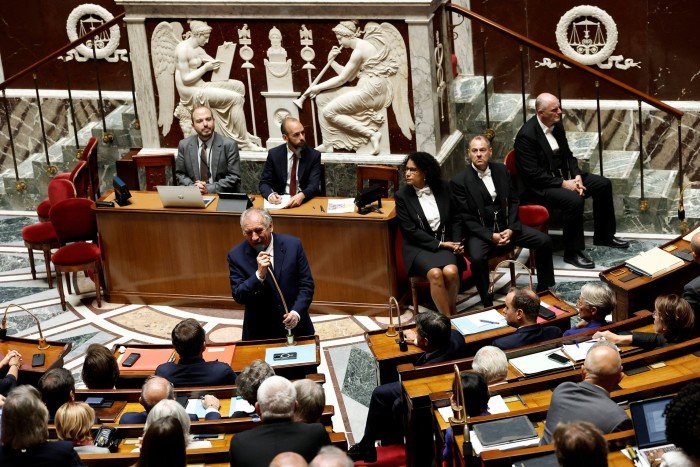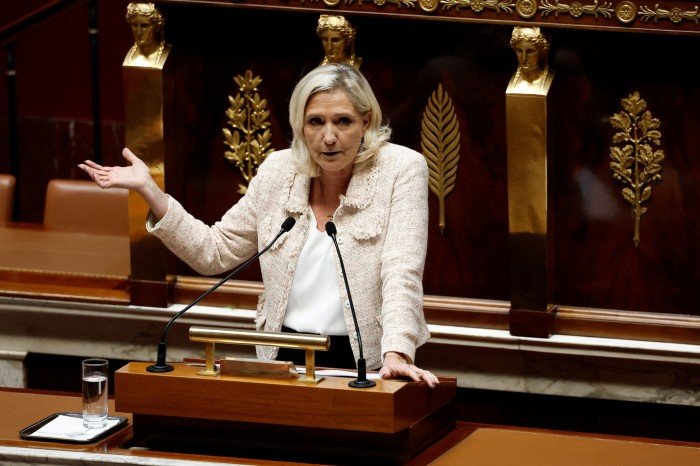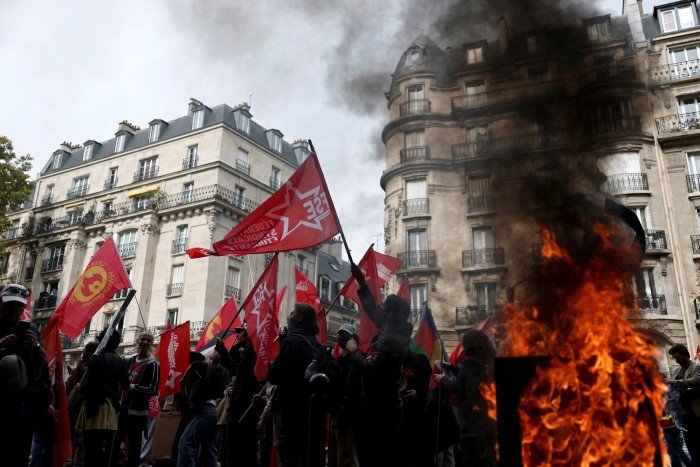The collapse of Sébastien Lecornu’s government on Monday before it was even sworn in has plunged France into fresh political turmoil, rattling markets.
Lecornu was the third premier appointed by Emmanuel Macron since the president called snap elections last year to head off the far right. It turned out to be the shortest-lived premiership since 1958, leaving Macron with few viable options and increasing the likelihood of another early parliamentary vote — all while France’s borrowing costs are rising.
In the absence of a parliamentary majority, Macron is increasingly losing allies and has a narrowing pool of candidates able to unite warring sides and agree on a budget for next year to tackle a gaping public deficit.
Why did Lecornu quit and what does it mean?
Lecornu is a close Macron aide, crisis fixer and former defence minister. His failure to find a compromise on the 2026 budget that would have been palatable to the president’s camp, the centre right and the centre left does not bode well for any future nominees.
The premier’s fall less than a month after being appointed by Macron is only bolstering far-right leader Marine Le Pen, who has been calling for new elections. Opinion polls show her Rassemblement National — the largest single party in parliament — is the voters’ preferred choice, at least in the first round of legislative elections.
The concessions Lecornu was willing to make to the Socialists fell short of their demands to tax the rich and freeze a pensions reform. Instead, he bet on a pledge not to circumvent parliament when adopting the budget — but that proved too little, too late.
On the centre right, Lecornu’s pick for former finance minister Bruno Le Maire to return as defence minister alienated Les Républicains (LR), which wavered on their previous support.
Interior minister and LR leader Bruno Retailleau said he wasn’t told of Le Maire’s appointment in advance and that it had led to a “problem of trust” — and his threat to walk sealed Lecornu’s downfall. Le Maire later on Monday withdrew, saying he did not want to “block the proper functioning of the country”.
Lecornu later also said Macron had tasked him with last-ditch talks with political parties “for the stability of the country”, adding that he would inform the president of their results by Wednesday evening, so Macron could “draw the appropriate conclusions”.

What are Macron’s options?
Macron’s appointment of Lecornu was seen as a last roll of the dice by many analysts and political insiders. Yet there is no obligation for the president to call snap elections now, given that neither his camp, nor the Socialists or LR would benefit from such a move.
He could still opt for a leftwing figure, such as Bernard Cazeneuve, a Socialist former prime minister mooted as a possibility.
The president has long resisted such an appointment, given the left’s demands for a wealth tax and to roll back some of Macron’s flagship pro-business reforms.
Macron could play for time and pick a non-affiliated technocrat.
France could also be governed by Lecornu as caretaker prime minister, with the cabinet he just named.
“You could have a zombie government for some time,” said Mujtaba Rahman of Eurasia Group.
In a parting shot on Monday, Lecornu said his opponents had become impossible to work with: “I was ready to compromise but every party wanted other parties to adopt all of their policies.”
Should Macron dissolve parliament, elections would take place within 40 days.

What would be the outcome of a snap vote?
A snap vote could still result in a hung parliament and fail to break the political deadlock.
Even before the appointment of Lecornu’s ill-fated cabinet, 61 per cent of French voters favoured fresh elections, according to a September poll by TF1-LCI.
France’s two-round voting system complicates parliamentary polling, but surveys by Ifop and Cluster17 conducted in recent weeks all predicted that Le Pen’s far-right party and its allies would gain the most votes in the first round.
A big question mark hangs over the quarrelling left, which last year banded together and overtook RN in the snap election as the largest group in parliament. But the Socialists and Jean-Luc Mélenchon’s far-left La France Insoumise have since fallen out, and it remains unclear whether they can overcome their differences.
The centrist bloc that backs Macron is projected to lose out the most. Ifop predicted the alliance would secure only 14 per cent of the vote in the first round, four points fewer than in 2024.

What will happen to the French budget?
If Macron calls elections again before the end of the year, it is virtually impossible for a new government to be formed in time to then make a budget proposal and get it through parliament. Budget plans are usually put forward in the autumn to allow for 70 days of debates and amendments in the lower house.
That scenario looks increasingly improbable even if Macron appointed a new prime minister this week. It is not clear whether a caretaker government can take a budget forward.
France has mechanisms to avoid a US-style shutdown, by rolling over the 2025 budget into the new year — something it did in late 2024 when then-prime minister Michel Barnier was ousted over his draft budget.
There are downsides to that provision: the budget would not allow for any changes in taxation or cuts to some expenditures such as pensions that are indexed to inflation.
As its borrowing costs go up, France will find it difficult to rein in its public deficit. Lecornu sought to increase taxes and cut spending to bring the deficit to about 4.7 per cent of GDP in 2026, from the expected 5.4 per cent this year. He had warned it could slip to 6 per cent without a budget.

Is Macron’s job on the line?
Under the French constitution, the president is elected separately and Macron’s second term runs until 2027. He has repeatedly ruled out stepping down before his mandate is over.
But calls for his resignation have grown louder, including from some of his former allies in the LR and from protesters taking to the streets in recent weeks. Many see the current crisis as one of Macron’s own making, which he should be held responsible for — and the only way to break the deadlock.
Macron’s former prime minister in his first term, Edouard Philippe, on Tuesday urged the president to bring forward the presidential contest, once the 2026 budget has been agreed. “Another 18 months of this is far too long,” he told RTL.
“The interests of France require Emmanuel Macron to resign in order to preserve our institutions and to unblock a situation that has been unavoidable since the absurd dissolution [of parliament in 2024],” said David Lisnard, LR vice-president, on X.
“He is primarily responsible for this situation.”


